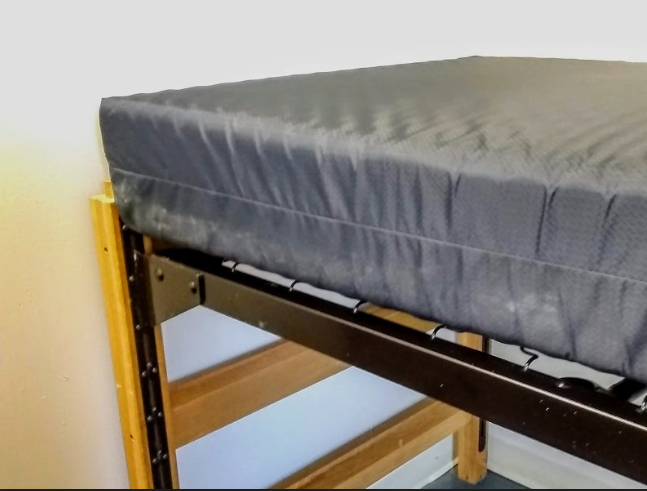Windows Sealed Shut To Prevent Mold Growth

The Article below was published in Vol. 135, Issue 1 of the Lake Forest College Stentor on September 20, 2019
On Lockdown for Your Health: Windows Sealed Shut to Prevent Mold Growth
By Emma Overton ‘22
Managing Editor and News Editor
Nearly half of the over 1,000 Lake Forest College residential students were welcomed back to college this fall with a last-minute notice that their windows had been sealed shut, a precaution College administrators claim is needed to stop the growth of mold and mildew in air-conditioned student housing on campus.
On August 6, 2019, with mold and mildew appearing in student housing, Director of Residence Life Stacy Oliver-Sikorski sent a campus-wide email explaining that all windows in air-conditioned residence halls would be sealed shut as, “even partially open windows allow too much moist external air to enter the buildings, leading to potential microbial growth.”
According to the Centers for Disease Control website, mold can cause “nasal stuffiness, throat irritation, coughing or wheezing, eye irritation, or, in some cases, skin irritation.”
As longer periods of warmer temperatures and higher humidity become more constant, Lake Forest College and other colleges across the country are grappling with mold and mildew growth in their residence halls. Schools like the University of Tennessee at Knoxville and Indiana University have been forced to evacuate entire residence halls affected by mold growth, leaving college administrations to brand the situation the result of “a new climatic normal,” notes a 2018 Chronicle of Higher Education article.
The resulting mold growth from a combination of open windows and running air conditioners is a problem that Lake Forest College first attempted to combat in August 2017 by installing two-inch window opening stops in its four air-conditioned residence halls: Cleveland-Young, Deerpath, Moore, and Nollen. In the fall of 2017, Stentor staff reported that students expressed their dissatisfaction with the measure, citing students’ concerns about being deprived of fresh air.
At the same time, The Stentor also reported that College administrators expressed their own frustration with students who refused to keep their windows closed while using air conditioning. “At least once a semester for the past three years, including summer sessions, we’ve sent emails to the residents of air-conditioned buildings requesting that they leave their windows closed while the air conditioning is running,” said Oliver-Sikorski.
In a recent interview with Stentor staff, Director of Facilities Management David Siebert explained the campus mold problem even after two-inch window stops had been installed. “It became apparent after rainy days and hot, humid weather, but it was very apparent prior to the College move in the Fall of ’18,” he said. “We had approximately 20 work order requests concerning mold/mildew-like investigations.”
Siebert continued, ”Mold in residence halls is not a new thing or a uniquely Lake Forest College problem. The College had to weigh the consequences, both in health effects and cost, of continuing to allow windows to be opened and found that we had no choice but to permanently seal them.”
Not all Lake Forest students agree. Moore Hall resident Sarah Coffman ‘21 of Oak Lawn shared her concerns over the College’s decision during a recent interview with Stentor staff, stating, “It is disappointing that we aren’t able to enjoy the fresh air in our rooms while the weather is nice, since we spend so much of the year with our windows closed already. Residence Life should have either kept students in the loop about the issue rather than emailing last-minute after they nailed all of the windows shut, and I most definitely think the school should have considered an alternative option.”
However, other students such as Deerpath resident Colin Russell ‘22 of Mount Prospect, hold different opinions. “If mold is going to be reduced, I have no problem with the windows being permanently closed.” Agreeing with Russell, Nollen resident Britt Dahlin ‘21 of Libertyville said, “Not opening windows when our air conditioning is in use will help prevent mold, which can harm students’ health. If you need fresh air, you can go outside.”
Reminding students that their actions play a vital role in combating the mold problem, Siebert explained, “Mold needs moisture and food. I have seen moldy-mildewy growth in a humid room where someone appeared to have accidentally sprayed a Coke can across the wall . . . the growth mimicked the outline of the ‘spray.’ Being conscious of your environment’s humidity and cleanliness is a good place to start.”
Oliver-Sikorski’s recent email encouraged students “to turn the air conditioning down but not off entirely. It’s important to have some cool air circulating in your room at all times.”
Emma Overton can be reached at overtoneg@lakeforest.edu.
